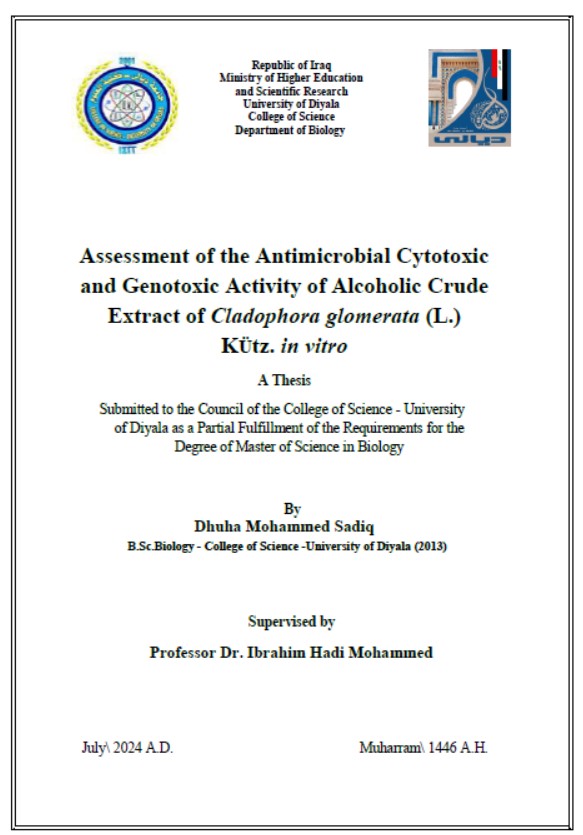Abstract
The current study included the isolation, purification, and identification of Cladophora glomerata that collected from Hassan Al-Hamoud stream near the College of Engineering – University of Diyala, A pure culture of the algae was prepared and then cultured and grown in Chu-13 culture medium under standard conditions (2 ± 25°C, 3000 lux light intensity, and 16:8 light: dark photoperiod), after that the crude alkaloid and active compounds were extracted from the dry biomass of the algae.
The present study aimed to test the effect of the crude alkaloid extract of C. glomerata as an antimicrobial, on the proliferation of human blood lymphocytes and on three cancer cell lines, as well as test its effect on the gene expression of some cellular genes. A chemical detection of some chemical components of C. glomerata extract, showing that the moss contains a group of active compounds such as alkaloids, tannins, phenols, flavonoids, terpenes and glycosides.
The antibacterial activity of the crude alkaloid extract of C. glomerata was detected using etch diffusion method, and the results showed that the highest zone of inhibition at 250 μg/ml was observed for S. aureas and P. mirabilis, which reached (19) mm, followed by P. aeruginosa, K. pneumonia, and E. coli with an inhibition diameter of (13, 14, and 16) mm, respectively. The highest zone of inhibition was observed at a concentration of 125 μg/ml in S. aureas, which reached (16) mm, followed by P. mirabilis and E. coli at the diameter of inhibition (14 and 11) mm, respectively, while there was no obsersed effect for the crude alkaloid extract at 125 µg/ml.in K. pneumonia and P. aeruginosa.
The second test included the effect of the crude alkaloid extract on the division of human blood lymphocytes, where the cells were exposed to a series of prepared concentrations of the alkaloid extract for 24 hours. It showed that the crude alkaloid extract inhibits the division of lymphocytes in human blood in the tropic phase at different rates. The percentage of inhibition increases with increasing concentration, and the percentage of inhibitory cells in the metaphase phase ranged between 0.12 – 3.80% for concentrations from 15.1 – 1000 µg /ml.
The cancer cell lines used in this study included the Hepatocellular carcinoma cancer cell line (HepG2), Henrietta human cervical cancer cell line (HeLa), and the normal Mouse Embryo Fibroblast cell line (MEF). All these lines were treated with different concentrations of the crude alkaloid extract of C. glomerata. The results also showed an inhibitory effect of the crude alkaloid extract of C. glomerata on cancer cells compared to normal cells and the degree of effect depends on the concentration of the extract and the type of cells. The anti-tumor inhibition efficacy was found to increase with increasing concentration of the extract. It was found that the growth rate of the HepG2 cancer cell line was30. 88% at a concentration of (15.1) μg /ml, but increased to84. 90% at a concentration of 1000 μg /ml, while in the growth rate of the HeLa cancer cell line, the lowest inhibition rate was 14. 10 % at a concentration of 15.1 μg /ml and the highest was 88.29 % at a concentration of 1000 μg /ml. In the normal MEF cell line, the lowest inhibition rate was 2.31 % and it was increased to 23.2% at a concentration of 1000 μg /ml.
The half-life inhibitory concentration of the crude alkaloid extract was used on the gene expression of genes encoding heat shock proteins Hsp60, Hsp70, Hsp90 as well as cell death genes Bcl2, P53, and Caspase-8 by real-time polymerase chain reaction using Kapa syber green dye, and morphological changes were observed using Acridine Orange/Propidium Iodide dye and examined using fluorescence light microscopy.
Gene expression results after treatment of cell lines cells with the IC50 of crude alkaloid extract showed that the expression of genes encoding heat shock proteins Hsp 60, Hsp 70, and Hsp 90 were inhibited in the liver cancer cell line (0.44, 0.43, and 0.47), respectively, and in the cervical cancer cell line (0.11, 0.14, and 0.18), respectively. The gene expression of genes encoding apoptosis was increased in all cell lines (HepG2, HeLa, and MEF cell lines), including the Caspase 8 gene, which was (1, 87, 1.99, 3.42) and p53 gene (0.17, 0.22, 1.76) while Bcl2 gene expression (0.51, 0.64, 0.65). The DNA assay also showed nuclear discontinuity and chromatin condensation in cells treated with crude alkaloid extract is a marker of programmed cell death.
The results show that crude alkaloid extract of C. glomerata has an antimicrobial and antitumor effect and could induce apoptosis and inhibit the gene expression of heat shock proteins in cancer cells.




